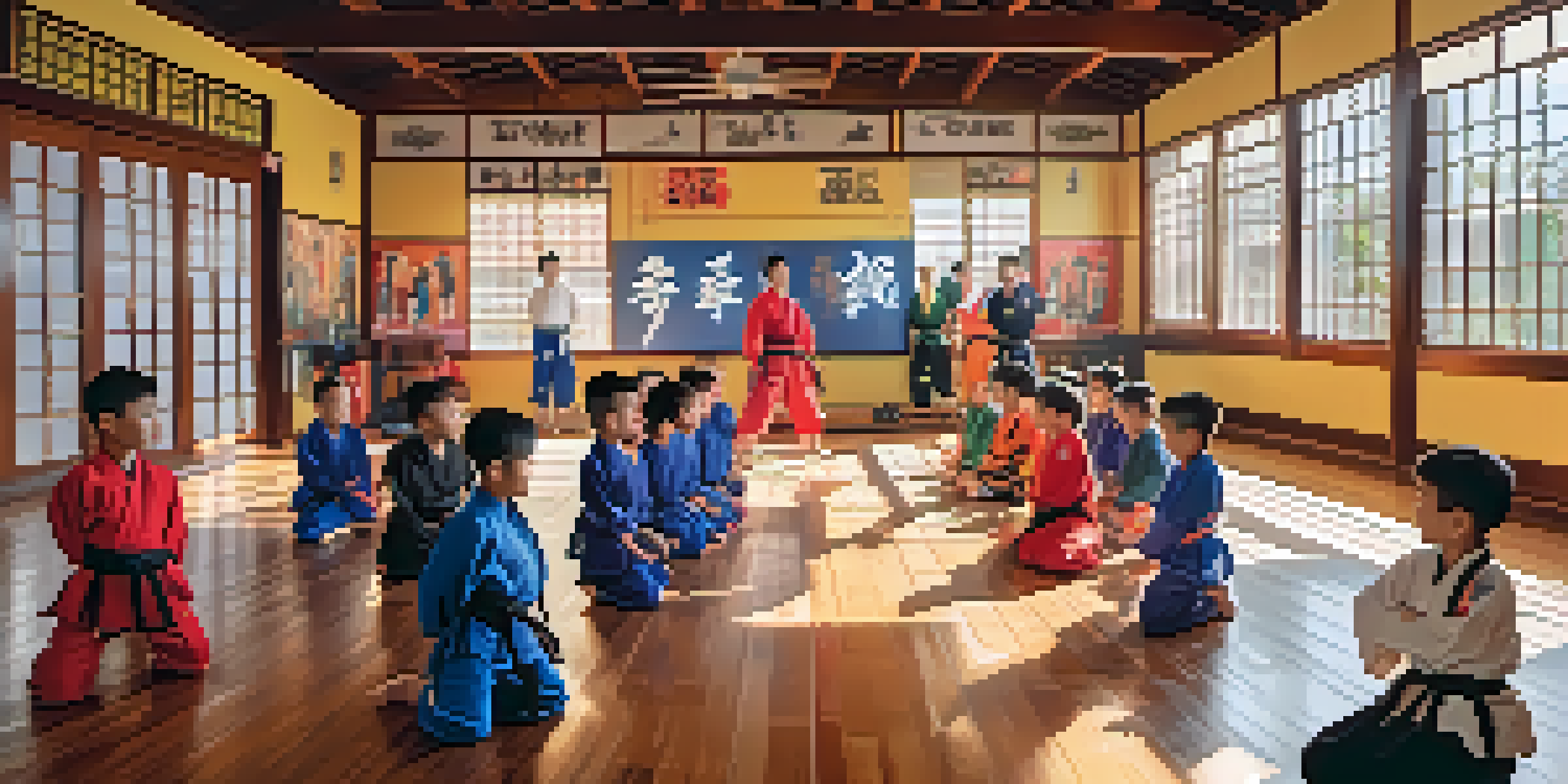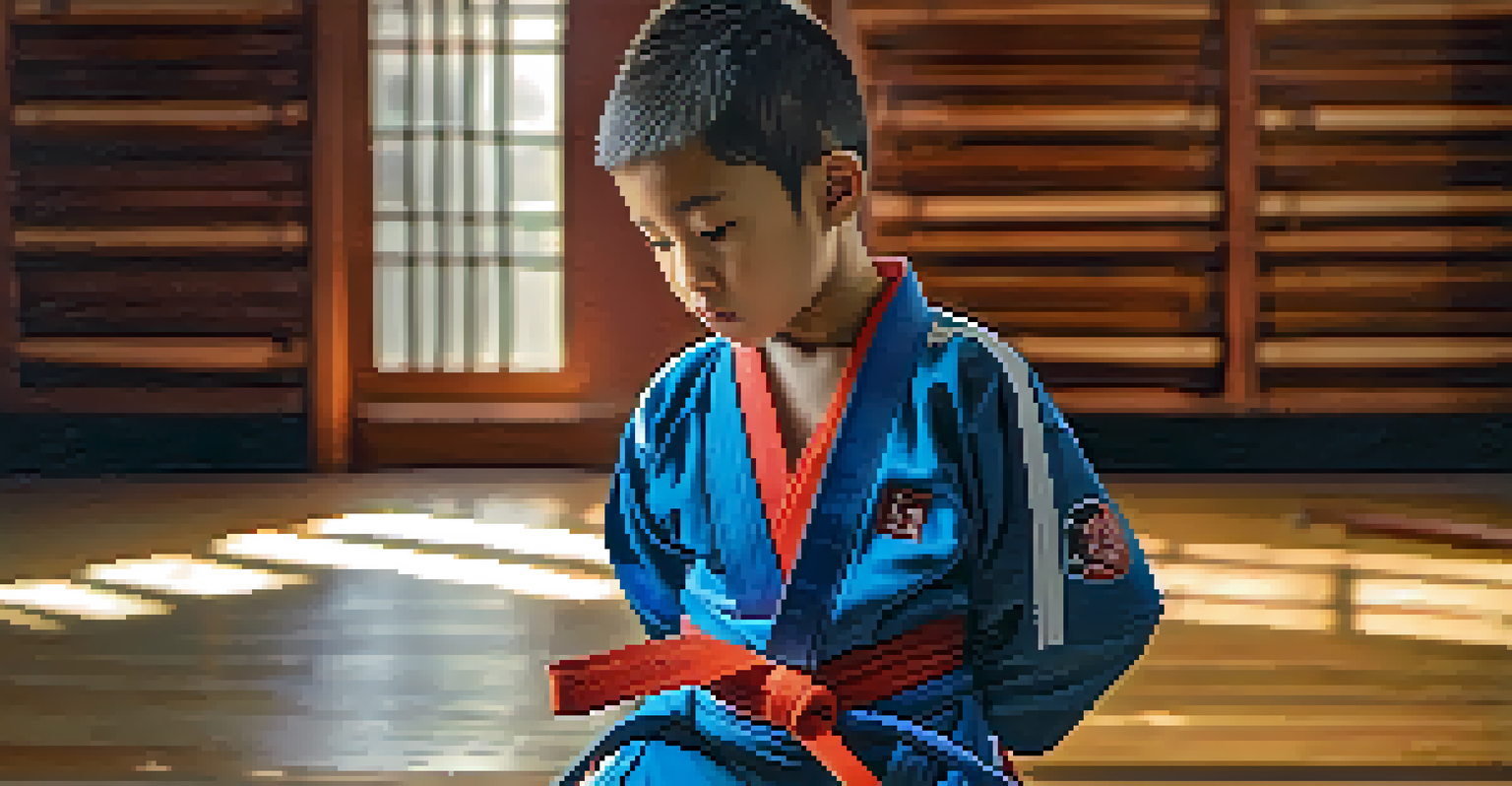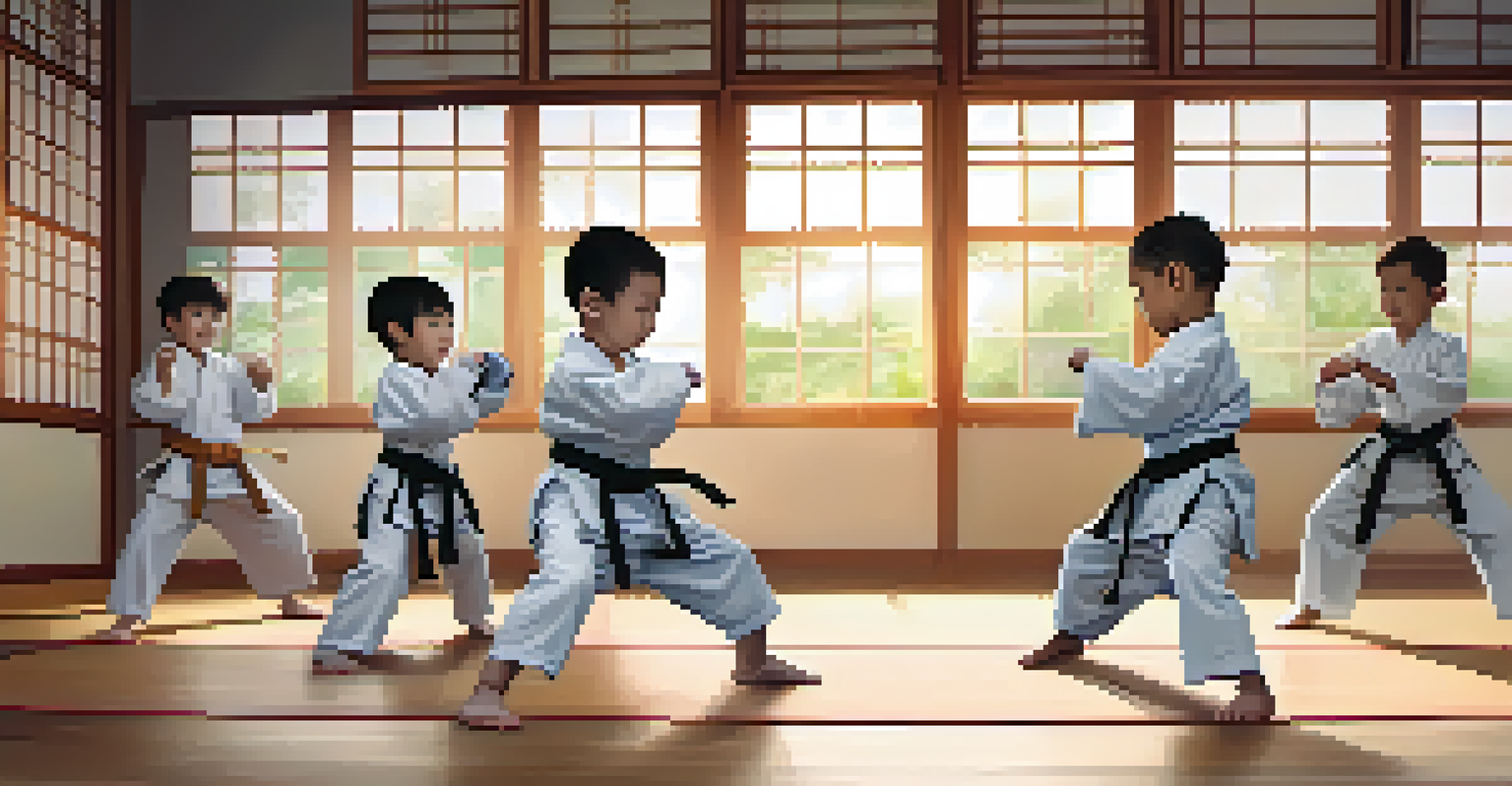Martial Arts Programs for Youth: Building Bonds and Skills

The Importance of Youth Martial Arts Programs
Martial arts programs for youth offer more than just physical training; they provide essential life skills. From discipline and focus to respect and teamwork, these programs help shape well-rounded individuals. Engaging in martial arts can also help young people navigate the challenges of growing up, giving them a constructive outlet for stress and frustration.
Martial arts is not about fighting; it's about building character.
Moreover, martial arts encourage personal growth by setting achievable goals. As children progress through belts and techniques, they experience a sense of accomplishment that boosts their self-esteem. This journey of self-improvement fosters a mindset that values perseverance, which is invaluable in all areas of life.
In a world increasingly dominated by screens, martial arts offer a healthy alternative. They promote physical activity and social interaction, helping youth build friendships in a supportive environment. This combination of physical and social development lays the groundwork for a balanced and fulfilling life.
Building Confidence and Self-Esteem
Participating in martial arts can significantly boost a child's confidence and self-esteem. As they learn new skills and techniques, they become more aware of their capabilities. This newfound confidence often spills over into other aspects of their lives, such as school and social interactions.

Additionally, martial arts provide a safe space for young people to challenge themselves physically and mentally. Each successful sparring session or belt promotion reinforces their belief in their abilities. This sense of achievement is especially important during adolescence, a time when self-doubt can be prevalent.
Life Skills Beyond Physical Training
Youth martial arts programs teach essential life skills such as discipline, focus, respect, and teamwork.
Furthermore, martial arts teach children how to handle failure gracefully. Learning to get back up after a fall, both literally and metaphorically, instills resilience. This ability to bounce back is a key component of confidence, equipping youth to tackle challenges head-on in the future.
Fostering Discipline and Focus
Discipline is a cornerstone of martial arts training, and it starts from the very first class. Young participants quickly learn that success comes from consistent practice and dedication. This structured environment teaches them the importance of commitment and hard work, skills that are transferable to academics and other pursuits.
The journey of a thousand miles begins with one step.
Focus is another critical skill nurtured in martial arts classes. Whether it’s concentrating during a lesson or being attentive during sparring, these activities require undivided attention. As children learn to hone their focus, they also become better listeners and learners, which can lead to improved academic performance.
Moreover, the practice of mindfulness in martial arts helps youth manage distractions in a fast-paced world. By training their minds alongside their bodies, they develop a greater awareness of their surroundings and emotions. This enhanced focus not only benefits their martial arts journey but also contributes to their overall well-being.
Encouraging Respect and Empathy
One of the foundational principles of martial arts is respect—respect for instructors, peers, and oneself. In a martial arts dojo, children learn to greet their teachers and fellow students, fostering a culture of mutual respect. This simple act can significantly influence how they interact with others outside the dojo.
As kids train together, they develop empathy for their peers. Understanding the physical and emotional challenges that come with learning martial arts creates a bond among students. This camaraderie helps cultivate a supportive community, where everyone encourages one another to improve.
Boosting Confidence and Resilience
Martial arts help children build confidence and resilience by encouraging them to overcome challenges and learn from failures.
Teaching respect and empathy through martial arts prepares youth for a diverse world. They learn to appreciate different perspectives and backgrounds, which is crucial in today’s interconnected society. As they grow, these values will guide them in building meaningful relationships both personally and professionally.
Making Friends Through Shared Experiences
Martial arts classes are often a melting pot of personalities and backgrounds. As children train together, they forge friendships based on shared experiences and mutual goals. This camaraderie helps them develop social skills that can last a lifetime.
Working together in pairs or groups during training fosters teamwork and communication. These interactions teach youth how to collaborate effectively, whether in martial arts or other areas of life. The bonds formed in the dojo often extend beyond the training mat, leading to lasting friendships.
Additionally, participating in events like competitions or belt ceremonies brings students together in a supportive environment. Celebrating each other's successes creates a sense of community that enhances their martial arts journey. The friendships formed in these settings can provide a network of support that is invaluable throughout their lives.
Physical Fitness and Health Benefits
Engaging in martial arts is an excellent way for youth to stay physically active. The combination of cardio, strength training, and flexibility exercises provides a well-rounded fitness regimen. This physical activity helps combat the sedentary lifestyle that can come from excessive screen time.
Moreover, martial arts promotes overall health by teaching the importance of nutrition and wellness. Many programs incorporate discussions about healthy habits, encouraging kids to make better lifestyle choices. This holistic approach to fitness ensures that children not only grow stronger but also healthier in mind and body.
Fostering Friendships and Community
Training together in martial arts classes cultivates friendships and a supportive community among participants.
As youth continue their martial arts journey, they develop improved coordination, balance, and agility. These physical benefits not only enhance their martial arts skills but also contribute to better performance in other sports and activities. Ultimately, martial arts instills a lifelong appreciation for physical fitness.
Choosing the Right Martial Arts Program
Selecting the right martial arts program for your child is crucial for ensuring a positive experience. Consider factors such as the program's philosophy, the instructors' qualifications, and the environment. A supportive and encouraging atmosphere can make all the difference in a child's development.
It's also important to assess the types of martial arts offered. Different styles, such as karate, taekwondo, or jiu-jitsu, emphasize various skills and philosophies. Discussing these options with your child can help you find a program that resonates with their interests and goals.

Lastly, visit local studios and attend trial classes to get a feel for the environment. Observing a class in action can provide insight into the teaching style and the community dynamics. This hands-on approach ensures that you choose a program that aligns with your child's needs and aspirations.